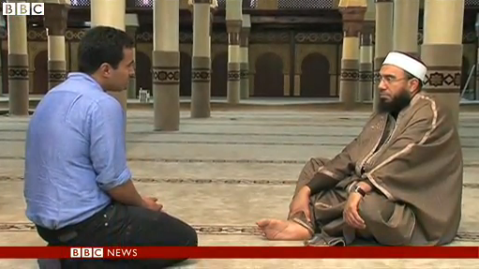On February 18th an article by the BBC’s Addis Ababa correspondent Emmanuel Igunza appeared on the BBC News website’s ‘Africa’ and ‘Middle East’ pages under the headline “Niger man deported by Israel marooned in Ethiopian airport”.
“A Niger national who was expelled from Israel has been stuck at the international airport in Ethiopia’s capital, Addis Ababa, since November after his home country refused to take him back.”
Igunza’s account of the story of “24-year-old Eissa Muhamad” went as follows:
“He had been living in the Middle Eastern state since 2011, having left Niger’s north-western Tilaberi region as a 16-year-old in search of a better life.
He said he paid traffickers to take him across Libya and Egypt before he entered Israel by foot.
Once in Tel Aviv, Mr Muhamad survived by doing odd jobs in hostels and in a sweet factory until April 2018 when he was arrested for being in Israel without proper documents.”
In other words, it is patently clear to the BBC’s correspondent that Eissa Muhamad entered and remained in Israel illegally. He continued:
“After several months in detention, Israel issued him an emergency travel document and put him on an Ethiopian Airlines plane, via Addis Ababa, to Niger in November. But on arrival in Niamey, Niger’s capital, he was refused entry by Niger’s authorities who alleged his travel document was false.
“They didn’t want me in Niger. They didn’t accept me,” Mr Muhamad said.”
Igunza did not bother to inform readers of the relevant fact that Niger severed diplomatic relations with Israel in 2002 before going on:
“After more than a week of being detained in Niger he was deported back to Israel. But Israel refused to accept him and detained him again for several weeks.
“They tied my hands and legs and forced me into a plane back to Niger which refused to accept me again,” the 24-year-old said.
Then the travel document issued by Israel expired when he was stuck in transit at Addis Ababa’s Bole International Airport after Niger refused to accept him for a second time.”
A month before this BBC article was published Eissa Muhamad told a somewhat different story to another journalist. [emphasis added]
“Muhamad tells me he has been deported twice from Israel in 2018. When he returned to Niger the first time, Muhamad’s Israeli travel documents were still valid, so he turned around and booked another flight back to Israel. When he arrived in Israel, authorities confiscated his travel documents and deported him again back to Niger. When Muhamad returned to Niger the second time, authorities requested proof of citizenship but he failed to produce valid documents, either Israeli or Nigerien, to support his citizenship.
Muhamad remained in Nigerien custody for eight days before being deported back to Israel via Ethiopia on an Ethiopian Airlines flight. When he arrived at Bole International Airport in Ethiopia, Ethiopian authorities, in collaboration with the Israeli government, prevented him from boarding his connecting flight to Israel. They informed him that Israel was not willing to accept him, and since then, he has been stranded inside the airport, stuck between Niger and Israel.”
Whichever of those versions of the story is more accurate, obviously the core story here is about a man from Niger refused entry by his own country. That story received just one sentence of treatment in Igunza’s report:
“The BBC has repeatedly tried to contact Niger’s foreign ministry and its embassy in Ethiopia without success to ask why their authorities believed the document was false.”
In comparison, the country which Muhamad entered and remained in illegally got four paragraphs of coverage:
“Israel’s immigration department defended itself, saying in a statement issued to the BBC that Mr Muhamad had been deported because he had been in the country illegally.
“He is a citizen of Niger. It has nothing to do with us because he was expelled from here and when he arrived in Niger, he refused to co-operate with the authorities. How is Israel connected? He is not an Israeli,” the statement said.
It rubbished [sic] allegations that the emergency travel document was a fake.
“The Laissez Passer is a transit document for foreigners. It was legally designed precisely for such cases,” the statement said.”
In addition, Igunza gave generous promotion to the view of a campaigning NGO which the BBC has quoted in the past in stories relating to African migrants.
“An Israeli non-governmental organisation working with migrants and refugees said Mr Muhamad’s case was similar to that of other migrants expelled from Israel.
“Other migrants deported from Israel with the Israeli travel document have been refused entry to their countries of origin, or other countries en route, because the authorities claim the Israeli travel documents are false, ” the Hotline for Refugees and Migrants said in a statement.
“In 2016 we published a report, Forgotten in Prison, which details the cases of migrants who are faced with the same problem,” it added
It also wants Israeli officials to investigate Mr Muhamad’s allegation that he was brutally assaulted while in detention.
“What is required now is that Eissa Muhamad be returned to Israel so that his accusations of brutality at the hands of Israeli immigration authorities can be investigated, and a solution found so that he may return to Niger,” said Shira Abo, [sic] the organisation’s spokesman [sic]. ”
”
Additional signposting to readers of this article comes in the form of an embedded video dating from March 2018 titled “The Eritrean runner fearing deportation from Israel”, an image captioned “Many migrants who enter Israel illegally end up in detention centres” and a link to a report from February 2016 by Kathy Harcombe titled “Israel’s unwanted African migrants”.
It is hence amply clear that BBC audiences were steered towards the view that it is yet another story about Israel’s treatment of African migrants rather than one about Niger refusing to give entry to one of its own citizens following his deportation from a country which he entered illegally.
Related Articles:
BBC Africa misrepresents campaigning reports as ‘scoop’




